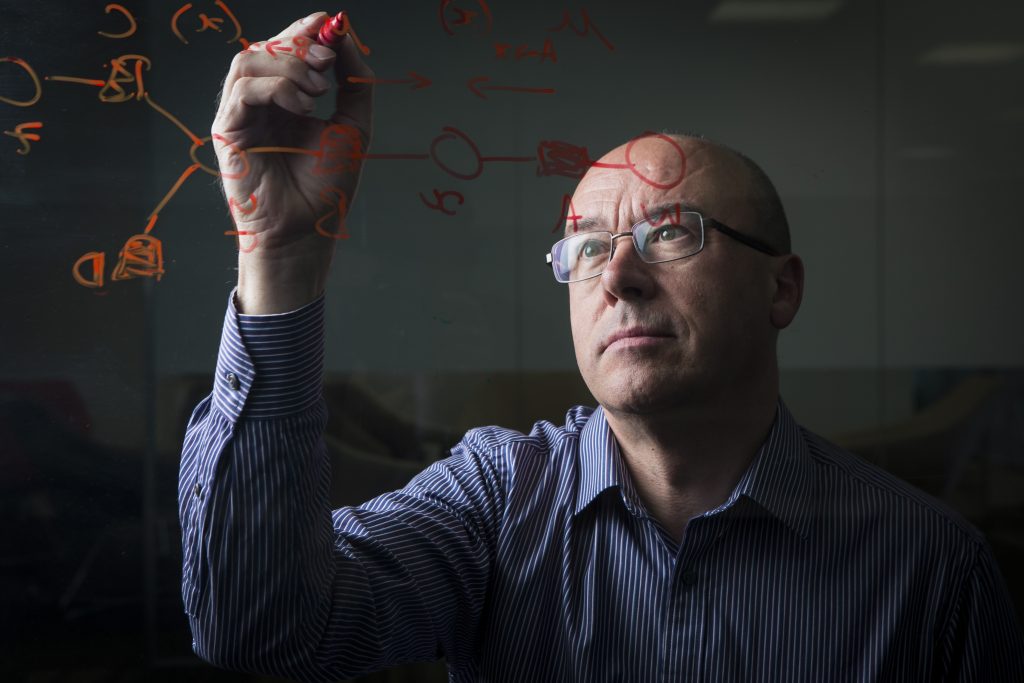
Chris Bishop: UK has a window of opportunity to lead the AI revolution but only if we invest now
By Chris Bishop, Lab Director, Microsoft Research Cambridge
This week, the brightest minds in artificial intelligence gather at the most prestigious academic conference for machine learning in the world. In the last three years, attendance at Neural Information Processing Systems (NIPS) has doubled to around 8,000 delegates. This year’s conference, which takes place in Long Beach, California from 4th to 9th December, is completely sold out.
As the world’s largest gathering of AI talent, NIPS has become the industry’s unofficial hiring event of the year. The ascendance of AI and machine learning has led to a surge in demand for new talent with different skills – skills that are in short supply. This in turn has led to fierce competition, high salaries and a depletion of talent in academia, which threatens to undermine future generations.
AI is fast becoming a battle for supremacy and the UK must compete for the best talent or we risk losing out on a game-changing generation that will drive innovation in healthcare, manufacturing, finance and many other industries.
Microsoft Research Cambridge has been at the forefront of AI, machine learning and deep learning research for 20 years. Our work contributes to many Microsoft products and features, such the Seeing AI app that was introduced in the UK this month. We encourage a collaborative, cross-disciplinary approach to research and promote an inclusive, culturally diverse working environment. We want to work with researchers who share our goal of amplifying human ingenuity in partnership with machines, not in opposition to them.
About 30 years ago, I made the decision to switch from Physics to Computer Science and took an interest in machine learning in the belief that one day it would lead to great things. It’s taken longer than I anticipated for that to happen, but now we’ve arrived at a defining moment in technological development.
When Intel founder Gordon Moore first observed that the number of transistors in an integrated circuit doubles every two years, it rewrote the rules of hardware. In the same way, AI is rewriting how we conceive of and write software. Until now, software has been written to run machines. Now we’re writing software to help machines learn to perform certain processes for themselves. We stand on the brink of a technological revolution that will change how we live and work, how we build things, how we fight disease and how we protect what’s most important to us.
The UK is uniquely positioned to lead this technological revolution. The country is fast becoming a hotbed of AI talent, with a new AI startup being founded every week. Some of the best-known AI startups are British and these companies are attracting investment from around the world. Yet there is a severe shortage of AI and machine learning researchers and engineers in the UK. If we want to attract the best, it is vital we show these researchers and engineers why the UK is the best place in the world to do their work.
In the last three years, the number of AI jobs in Britain has soared by 485%. While we welcome last month’s Budget announcement that the government is to significantly increase funding for AI, we need initiatives that go further to increase the number of computer science students in every school in the country, and that will double the number of PhD students, if we are to capitalise on this window of opportunity.
A recent survey found that Britain’s top universities were struggling to keep up with the demand from tech firms that are aggressively expanding their AI research groups. I am fearful that that our hopes for an AI boom in the UK could falter if industry continues to drain the academic talent pool unchecked.
For this reason, Microsoft takes a very different approach. We aim to preserve and nurture talent within academia through partnerships with universities and other institutions in a way that is sustainable and mutually beneficial. Many of our researchers maintain roles in universities and some move back into academia having spent several years with us.
We provide regular funding to universities for PhD student scholarships and our researchers co-supervise PhD students based in universities, amplifying the university experience for the students. We also offer paid internships, which involve working on projects alongside a team of Microsoft researchers.
We hope that, by encouraging a healthy exchange between industry and academia, we can help to produce the world-class talent the UK needs to become a leader in AI. Without it, we risk undermining the long-term health of our industry and the economic prospects for our country.


